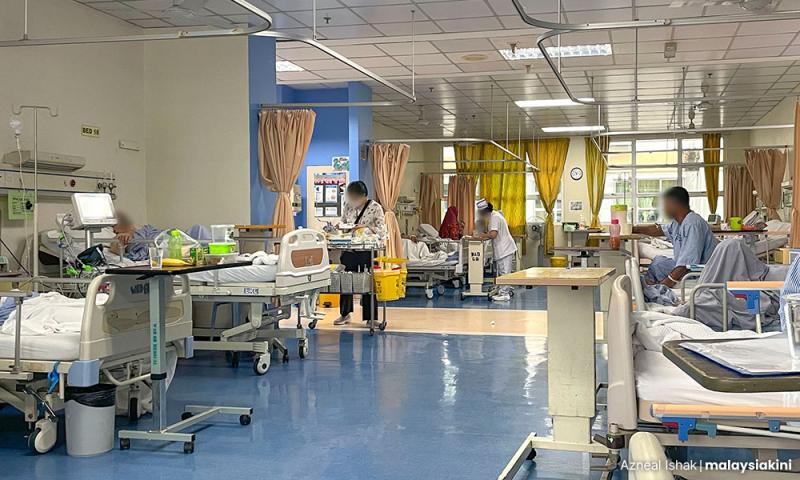LETTER | Do patients have rights to decide for themselves?
LETTER | In the late 1970s and even 1980s, it was not uncommon for physicians to assert that patients had needs, not rights. The patient had a “need” and the doctor with his vast experience and training knew what was best for the patient.
The patient basically had no say. The idea that patients have rights was thought to bring about conflict and discord in the doctor-patient relationship.
This attitude has almost certainly disappeared. Today, the term “patients’ rights” is taken for granted in much of the doctor-patient relationship.
Increasingly, there has been acceptance of patients’ rights including the right to healthcare; the right to adequate information to make an informed choice; the right to privacy and confidentiality; the right to redress; and the right to dignity
In fact, patients’ rights have increasingly come to be recognised as a particularly important component of human rights.
Should patients indeed have rights?
All of us do not want to be sick. Most of us prefer not to think about patients’ rights because we don’t like to think of ourselves as sick or dying. We are masters of denial.
Powerful influence
Nonetheless, all of us are likely to be sick many times in our lives. We also may have opportunities to help sick families and friends.
It is thus important that as consumers we are active decision-makers in medical treatment because medical decisions will have a powerful influence on our bodies and our lives.
That is why medical decisions are fundamentally personal decisions; different people have different values on longevity, functioning, risk and appearance.
In 1995, Fomca published the first Patients Charter endorsed by the then healthcare and pharmaceutical sector.
I am not certain how many hospitals or clinics actually implemented it at that time. But I do remember one user of the Patients Charter Version 1.
Two premises
In 2004, Anwar Ibrahim (while incarcerated at that time) was denied the opportunity to go overseas for a specific micro-surgery and the best prognosis for recovery was for an operation on spinal surgery overseas.
Quoting the Patient Charter, he asserted that it was his right as a patient to make an informed choice about the best medical treatment he wanted to undergo and have access to that treatment.
Also, Amnesty International asserted that Anwar should be allowed to seek the medical treatment which he and his medical advisers considered necessary.
Patient’s rights are built on two premises: patients have rights that are not automatically forfeited by becoming sick or entering doctor-patient relationships, and the doctor-patient relationship in which the rights and personhood of the patient are respected is the most beneficial model for medical decision-making for both patients and physicians.

In every situation, the physician and patient should be active allies who seek the same goal - the patient’s safety and well-being. Often there are external threats such as risk managers, third-party middlemen, medical insurance, or the health plan and its rules of benefits.
Economic considerations can and often do get in the way of optimal welfare of the patient.
Having said that, we recognise that the health system is complex and in Malaysia, there are many critical healthcare issues including overburdened public healthcare systems, lack of medical insurance, medical inflation, increasing costs of new and innovative technologies, and out-of-pocket expenses by consumers.
The purpose of the Patients Charter then is to encourage patients to exercise their rights, and help health professionals recognise, understand and respect patient rights.
There is no longer any doubt that patients have the fundamental right to make important decisions about what will (or will not) be done to their bodies by physicians or others; to obtain all relevant information to make those decisions intelligently; to be treated with dignity and respect; and, to have their privacy respected and their medical information kept confidential.
No one wants to be sick. Thus, society has an obligation to provide basic medical care to the sick and injured, not only because of the tremendous suffering people experience without it but also as a matter of human solidarity and decency.
On Aug 28, four organisations endorsed the Patients Charter 2023 (Version 2) to enhance consumer welfare and consumer well-being in Malaysia.
The four organisations are the Malaysian Medical Association (MMA), the Association of Private Hospitals of Malaysia (APHM), the Malaysian Pharmacists Society (MPS), and the Federation of Malaysian Consumers Association (Fomca). The signing ceremony was witnessed by Health Minister Dr Zaliha Mustafa.
PAUL SELVA RAJ is Fomca secretary-general.
The views expressed here are those of the author/contributor and do not necessarily represent the views of Malaysiakini
RM12.50 / month
- Unlimited access to award-winning journalism
- Comment and share your opinions on all our articles
- Gift interesting stories to your friends
- Tax deductable
